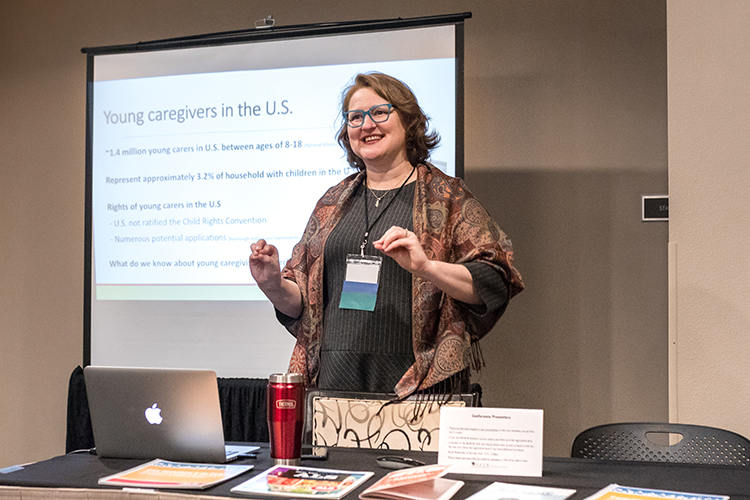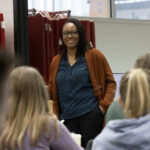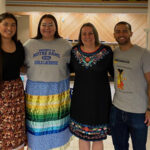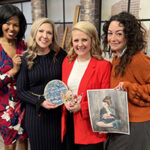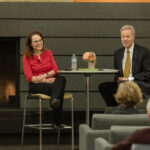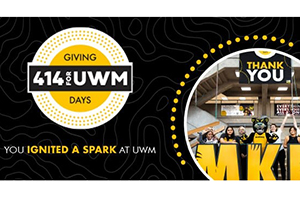When a parent is diagnosed with a serious illness, a child can respond in a variety of ways – depending on her age, the parent’s diagnosis, the family structure.
When that illness is amyotrophic lateral sclerosis, or ALS, the response can be both emotional and practical. That’s because many children assume caregiving responsibilities for a loved one with ALS as the disease advances and erodes a parent’s ability to walk, talk or even swallow.
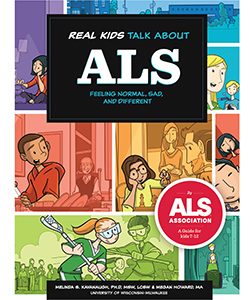
As a clinical social worker based in a St. Louis, Missouri, neurology unit in the early 2000s, Melinda Kavanaugh made home and hospital visits, walking these families through the typical progression of neurological disorders. What she learned altered the course of her career.
“I would go into homes and a 10-year-old would come up to me and say, ‘We have to bathe my dad,’ but there was just nothing to train kids or prepare them for these responsibilities,” recalled Kavanaugh. “It was eye opening and amazing to me, and I started a support group for kids; kids who were living in families with Huntington’s disease. They were so isolated in some ways, but they would open up about some extraordinary things they were doing.”
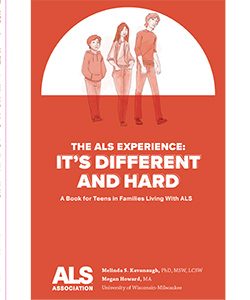
Now a researcher and associate professor at the Helen Bader School of Social Welfare, Kavanaugh has since expanded her work to interview hundreds of children whose parents and family members have neurological disorders, chronicling how family life changes after a diagnosis of Huntington’s or ALS. She’s taken these accounts to Capitol Hill and spoken internationally on the unique lives and support needs of young caregivers, an understudied group of children and young adults who number in the millions in the U.S. and provide vital care to parents and grandparents facing a serious, progressive illness.
Now, as an author, she’s giving these children a new voice and giving their families a valuable support tool. The national ALS Association has released a series of children’s books co-authored by Kavanaugh and Megan Howard, a project manager who works closely with the professor. Each book speaks to a distinct audience about the challenges and commonalities of ALS. The books provide an age-appropriate conversation by using the actual words of youths living through ALS in the family, and whom participated in research with Kavanaugh.
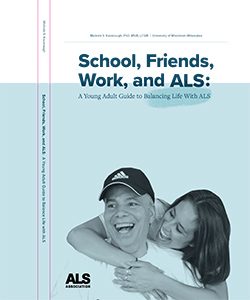
Each volume addresses what to expect when a family member is diagnosed, how to talk about the diagnosis and how to balance being a regular kid or young adult with being a caregiver.
“The greatest need for so many of our families is caregiving and support,” said Lori Banker-Horner, care services director for the ALS Association Wisconsin Chapter, a nonprofit that serves 400 Wisconsin residents with ALS.
Banker-Horner says that Kavanaugh’s compassionate, dedicated research approach has helped the association help closer to 1,000 Wisconsinites when you consider the children and partners of those 400 Wisconsin residents. Even physicians look to the organization for insight and support on treating affected individuals.
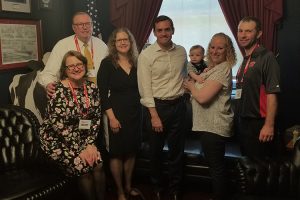
“Not everyone understands the disease or has had an experience with it. It’s easy to feel like you’re on an island all by yourself,” said Banker-Horner, who reviewed Kavanaugh’s books as a guest editor. “Without a doubt these books are going to benefit parents and people of many ages. Readers can pick up tools from these books that will make anyone feel more comfortable talking about ALS and connecting with people who have it.”
- A graphic novel for young readers, ages 7-11, helps children normalize their experiences and establish a vocabulary and comfort level so they can discuss the diagnosis and its effects with friends and family.
- A book and online interactive site for teens, ages 13-16, incorporates elements of digital storytelling with graphics for more of a “choose your own adventure” reading experience, based on the experiences of children Kavanaugh has met through her research.
- A book for young adults, ages 19-25, focuses on three families who have been affected by ALS, looking closely at how they navigate dating, college life, career exploration and other milestones when there is an ailing parent at home.
“The overriding theme of the books is getting rid of social isolation,” Kavanaugh said. “Many kids wonder: ‘Who do I talk to?’ Being a caregiver on top of that can amplify feelings of isolation.”
The national ALS Association has made online editions of the books available to member families of its state chapters. There’s no current plan to carry the books in traditional bookstores.
Training for child caregivers
Kavanaugh has also developed a training, skill and support protocol for young caregivers and has been a champion of the annual ALS Advocacy Day in Washington, D.C., which now includes training and team-building activities for child caregivers.
“The kids can start off kind of reserved,” she said, “but within moments they come out of their shells. They’re talking to each other and trying to understand what it feels like to wear a respiratory mask, playing with the idea of a machine that does all the breathing for you.”
Kavanaugh’s practical yet playful programming is a welcome reminder that kids can be kids even when faced with caregiving responsibilities for a loved one who is dying.
“It’s stressful and burdensome, but many children love being able to do this for a parent or family member,” she said. “But kids can also resent it. Young caregivers definitely talk about having to grow up too fast and losing their childhood.”
With a small group of colleagues, Kavanaugh continues to conduct research on young caregivers and advocate for additional research funding and support for them.
“Policy discussions are happening,” Kavanaugh said, “but it’s taken a very long time just to get the focus on patient care for adults. To make progress for child caregivers, policymakers will have to be okay with acknowledging the work of a child. That’s a hard thing for many people to do.”
